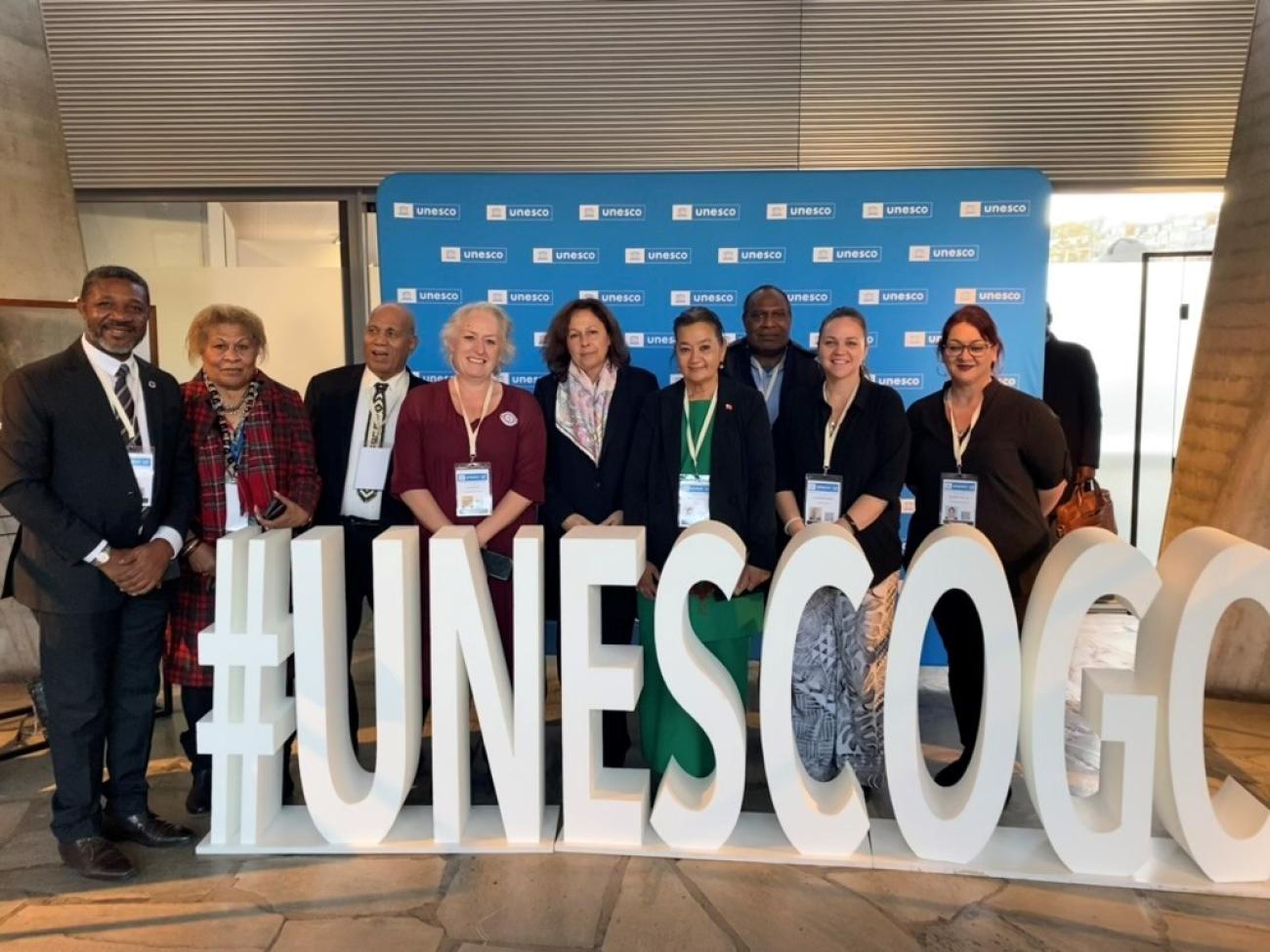Cook Islands elected to two key UNESCO committees
Thursday 30 November 2023 | Written by Supplied | Published in Economy, National

Permanent Delegate and Cook Islands Ambassador to UNESCO, Dr Nathalie Rossette-Cazel (centre), with Secretary of Education, Danielle Cochrane (second from right) and other Pacific representatives at UNESCO’s 42nd General Conference in Paris. MFAI/23112921
Cook Islands was elected to two key committees during the 42nd session of the General Conference of the United Nations Educational, Scientific and Cultural Organisation (UNESCO) this month.
The General Conference, which is held every two years, took place from November 7 to 22 at UNESCO headquarters in Paris.
Cook Islands was represented by the country’s permanent delegate and ambassador to UNESCO, Dr Nathalie Rossette-Cazel, foreign service officer Tatryanna Utanga, and outgoing Secretary of Education Danielle Cochrane.
Ambassador Rossette-Cazel headed the delegation.
According to the Ministry of Foreign Affairs and Immigration (MFAI), the conference determines the policies and the main lines of work of the organisation and sets the programmes and the budget. Among the notable outcomes of this year’s conference was a budget increase due to the return of the United States.
The conference also elects the Members of the Executive Board, one of the three constitutional governance organs of UNESCO, and appoints every four years the Director-General. In November 2021, the Cook Islands was elected for a four-year term as a Member of the Executive Board, and co-chair of the Financial and Administrative Commission.
Election of half of the Members of the Executive Board also took place during the 42nd session, with Australia, Cuba, and Mauritius elected to the Executive Board and the Dominican Republic re-elected.
“These countries will join the Cook Islands on the Board, and alongside the Cook Islands, provide the Pacific and Smaller Islands Developing States (SIDS) greater visibility and influence over UNESCO considerations,” MFAI said.
The 42nd Session also confirmed the election of the Cook Islands to the Legal Committee from 2023 to 2025, and to the Man in Biosphere reserve International Council from 2023 to 2027, and approved the 2023 to 2029 Operational Strategy and its programmes for SIDS, with a constructive meeting held between the United States and the UNESCO SIDS Group to discuss further support and funding.
Ambassador Rossette-Cazel, who was elected as the chair of the UNESCO SIDS Group in October 2020, collaborated very closely with the organisation to establish a SIDS Operational Strategy for the 39 SIDS countries from the Pacific, Caribbean, and Indian Ocean regions.
Secretary of Foreign Affairs and Immigration (MFAI), Tepaeru Herrmann said: “The partnerships that Ambassador Rossette-Cazel, together with other Pacific diplomatic envoys in Paris, Geneva, and Brussels, cultivates within the UNESCO fora to advocate for the interests of the Cook Islands, the Pacific, and by extension SIDS is important if we are to advance the education, science and cultural interests of the Cook Islands and the Pacific on the international stage.”
“Directed by MFAI headquarters and supported from capital by the Cook Islands National Commission and government and non-government entities, ensures our advocacy and contributions within the UNESCO fora are current, advance our interests, and secure resources to support transformative efforts within our communities.”
MFAI accredited Dr Rosette-Cazel received diplomatic status to UNESCO in 2017, which was at a time when the Pacific did not have representation on the UNESCO Executive Board, the statement said.
“Australia’s addition, alongside the Cook Islands, doubles the Pacific’s representation on the Executive Board, an investment expected to amplify the Pacific's influence in UNESCO matters in the months ahead.”
The General Conference is open to attendance by UNESCO’s 194 Member States, together with observers for non-Member States, inter-governmental organisations, and non-governmental organisations (NGOs). Each Member State has one vote, irrespective of its size or the extent of its contribution to the budget.











































